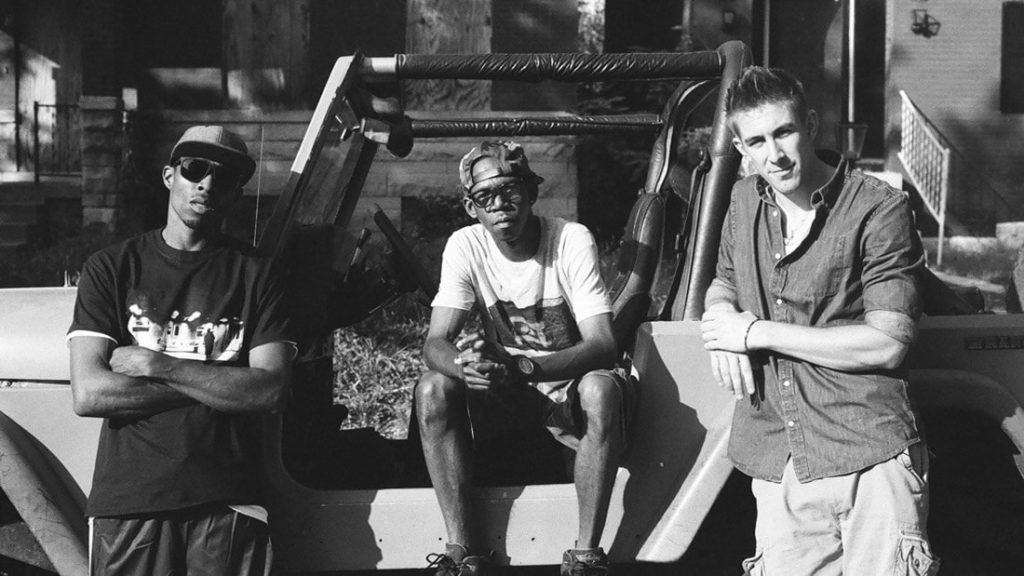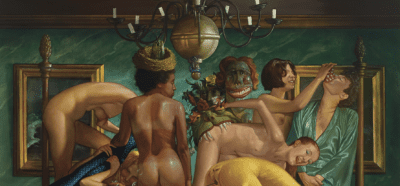Spirit of St. Louis: Talking to Spike Lee Protege Michael J. Larnell

Cronies
“There is definitely a struggle to hold onto childhood friends, as we get older and begin other lives,” says Michael J. Larnell, whose debut feature Cronies screens at DUMBO’s Made in NY Media Center by IFP from December 11-18. “I wanted to explore that at the beginning stages. I thought it would be something funny, but serious at the same time.”
Larnell would know—for this story about friendship, growing up, and remaining loyal to your roots, the NYU grad student and current Clinton Hill resident returned to his own hometown of St. Louis. Shot in black and white, Cronies is set largely over the course of a single sweltering summer day in the life of the perhaps significantly named Louis (George Sample III)—not a saint, but trying, with his young daughter’s birthday party coming up. Along for the ride are his childhood best friend Jack (Zurich Buckner), bonded to Louis through common boyhood trauma; and his new friend Andrew (Brian Kowalski), a work buddy with cargo shorts and gelled hair. Jack leans heavily on his past with Louis, and bums cigarettes off of Andrew, as the three coast through the day, bantering, consuming substances, and striking guarded buddy-buddy poses as they move towards some kind of reckoning.
Larnell has cited Mathieu Kassovitz’s La Haine as an influence, along with Spike Lee—who in his role as one of Larnell’s teachers was instrumental in securing grants for production, and signed on as executive producer on the strength of the film’s first ten minutes. The two would watch the film together “ten or fifteen times,” Larnell says, “and he gave notes on the edit each time,” quite an educational experience for the young filmmaker.
With its influences, the film shares not just the compressed time frame, palpable heat, and compressed racial allegory, but also a formal assurance, shading, like Lee’s work, into playfulness. The action is punctuated by faux-documentary footage, with Larnell as the offscreen voice “interrogating” the characters about their backstory and each other; the film shifts into color for flashbacks; and the dialogue is slung around in fluent, fluid slang, delivered with confidence and humor. The film’s music is credited to “St. Louis artists,” which turns out to mean a cross-section of local hip-hop, dance and rock acts, and the movie’s loose-limbed swagger plays as an expression of local pride. Asked to name previous films which have captured the spirit of his hometown, Larnell demures: “Unfortunately, there hasn’t been many major films shot in St. Louis. Especially films that are based on St. Louis as a major character in the story. I haven’t seen many films that makes me feel like, ‘This is what if felt like growing up in St. Louis.’ Hopefully, that changes.”
Larnell is the film’s director, writer, producer, and editor, and shot the film in less than two weeks. “We pretty much had to plan everything out and stick to it,” he admits, but there’s a freshness and naturalness to the lead performances, particularly during their in-character “interviews,” in which they field questions from an offscreen Larnell, who “definitely left room for them to say the dialogue how they would naturally say it,” he says. All the main cast members were found through open auditions; Larnell describes them as “very outgoing people,” which was crucial to the energy he wanted.
Cronies was shot in September of 2013, and Larnell had basically finished the movie by the time the St. Louis metropolitan area was caught up in the protests emanating outwards from Ferguson. A post-credits dedication in Cronies remembers Mike Brown, whose death, the filmmaker says, “impacted St. Louis in a huge way.” Since Brown’s death we’ve received frequent, insistent reminders of the way in which race can bend different people’s experiences of life into violently different shapes—this is a given in Cronies. It’s no coincidence, Larnell affirms, that at Louis’s particular crossroads he’s greeted with a black friend from out of a possibly buried past, and a new white friend from work and, potentially, the future. Very few films have really addressed the subject of interracial friendship in the way that Cronies does. At different times in the film, both Andrew, and Jack and Louis, have to step into new environments—dice games, pool parties—hang back, figure out how to act, and wait for some kind of sign that everything’s cool, everyone’s cool. But despite its antecedents, the film feels ultimately quite hopeful—honest about the moment-to-moment tension of these interactions, but also loose, positive, and with sense of how much can be accomplished simply by hanging out in good faith.
You might also like 



















